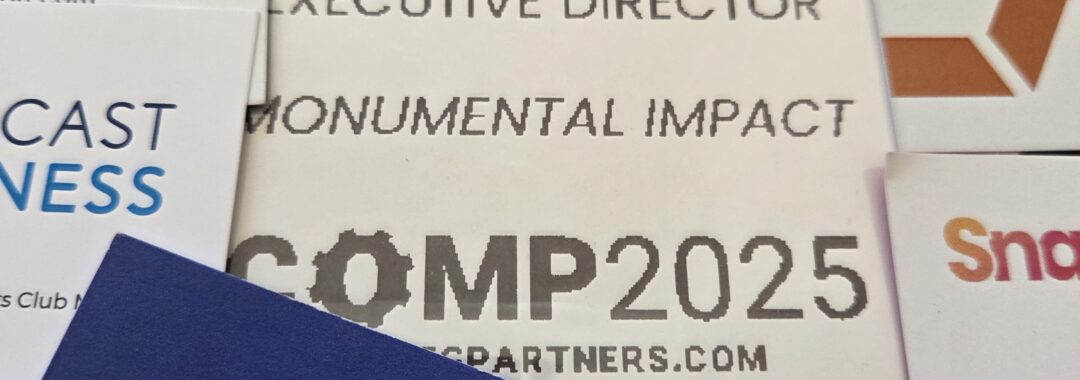COMP2025: Perspectives on Manufacturing, Workforce, and Global Growth
At the Colorado Manufacturing Partners 2025 Expo (COMP2025), industry leaders came together for an insightful panel on the future of manufacturing, workforce development, and global competitiveness. The discussion brought perspectives from global trade, workforce strategy, contract manufacturing, consumer-facing products, and large-scale operations.
Here are the highlights:
Colorado in the Global Economy – Karen Gerwitz, World Trade Center Denver
Karen set the stage with a macro perspective: Colorado’s economy ($553B GDP) ranks among the top 30 worldwide, comparable to Austria and Singapore. Despite this, Colorado ranks only 35th in exports of goods and 34th in imports, showing there’s untapped potential.
Opportunities ahead include positioning Colorado as:
- A centralized transportation hub for North America.
- A quantum innovation and R&D hub leveraging national labs.
- A global commerce hub beyond tourism and lifestyle branding.
Yet, uncertainty from tariffs, supply chain duplication, and workforce shortages are dampening growth. Her message was clear: Colorado can—and should—think globally, not just locally.
Workforce: The Biggest Challenge – Traci Marques, Pikes Peak Workforce Center
Traci brought the focus down to people. The top three challenges for manufacturers? Talent, talent, and talent.
Key points included:
- Too many postings require unnecessary bachelor’s degrees—companies must shift toward skills-based hiring.
- Locally, there are 733 open manufacturing positions (as of Aug. 2025).
- The Workforce Center supports employers through job description reviews, job fairs, and Employee Development Funds for reskilling staff.
She emphasized the importance of early talent pipelines, starting as early as middle school, and stronger integration of military transitions. Her call to businesses: share your required certifications, skills, and career pathways so workforce leaders can align the supply with your demand.
A memorable phrase she used to describe career pathways was:
“Stackable, rackable, and trackable.”
That means building entry-level opportunities where employees can stack new skills, rack them into logical career progressions, and track their growth through certifications and measurable achievements.
“When you look at talent, you need to start manufacturing your own homegrown talent.” – Traci Marques
Resilience and the Customer Treadmill – Grady Cope, Reata Engineering
Grady offered a candid view from contract manufacturing: the economy is uneven—some sectors are booming (defense), while others slow (medical equipment after COVID stockpiling).
His lessons learned:
- Treat business like a treadmill—you can’t step off customer development without consequences.
- Don’t stop looking for new customers during good times.
- In downturns, survival comes down to resilience, persistence, and putting customer service first.
As Grady put it: “When everything’s going good, all vendors look the same. When times get tough, that’s when the true partners show their colors.”
Balancing Costs and Opportunities – Jackie Sopko, Burro
Jackie spoke from a consumer-facing perspective. Her company imports raw materials, making them vulnerable to tariffs and fluctuating shipping costs. Pricing stability has been a constant challenge.
On the opportunity side, demand is growing thanks to the “Make America Healthy” movement, which has boosted interest in Burro’s personal water filtration systems. To stay competitive, they’ve leaned into AI tools for customer service and market strategy.
Her focus: balancing cost structure with long-term growth while maintaining customer trust.
Leadership, Accountability, and Culture – Dan Grady, Hercules Industries
Dan closed the panel with a leadership perspective. What keeps him up at night? Not tariffs or logistics—but leadership and accountability.
He stressed that:
- Culture is more powerful than strategy: “Culture eats strategy for lunch.”
- Retention isn’t about foosball tables or free lunches; it’s about meaningful work and strong leadership.
- Leaders must model accountability—even saying “I screwed up” can strengthen trust.
His bottom line: Employees stay when they feel valued, productive, and proud of what they do.
Takeaways
Across perspectives, a few common themes emerged:
- Global Opportunity – Colorado has the scale to compete globally, but needs stronger export performance.
- Workforce Crisis – Talent pipelines, skills-based hiring, and culture are key to long-term success.
- Resilience Matters – Customer service and adaptability define which companies endure downturns.
- Tech as a Lever – AI and automation are reshaping even small manufacturers’ ability to compete.
The COMP2025 panel underscored that while challenges are real, the future of manufacturing in Colorado is one of opportunity—if companies are willing to adapt, lead with accountability, and think beyond borders.
Monumental Impact’s Role
At Monumental Impact, we see these insights as a call to action. Our mission is to enable local entrepreneurs and innovators to bring their product ideas to life by providing access to prototyping equipment, technical mentoring, and a supportive community of peers.
We want to empower entrepreneurial makers like Gino DePolo—who brings unique creative products to life (read his story)—as well as entrepreneurs aiming to take their products toward eventual batch production.
We welcome others to get involved and join us in our mission of building opportunities for innovation, collaboration, and community growth in the Pikes Peak region.
Personal Connections and Thanks
A special thank you to Ken Rayment and Ben Helmreich of Better Process for taking time to indulge me in a conversation about my own maker project — a LEGO sorter. Conversations like these capture the spirit of COMP2025: sharing ideas, solving problems, and connecting across industries.
We also extend gratitude to Doug Rhoda (LinkedIn) for his keynote insights on mentoring, internships, and company culture — and to Christian Atkins, one of the first interns with Doug’s team and who is now a full-time employee with them at Vectis Automation. Their story illustrates the power of cultivating talent and investing in people.
Finally, a big thank you to Batina Aloisi and her team for organizing COMP2025. Their work in bringing together manufacturers, economic development, and community leaders made these conversations — and the connections that will follow — possible.
